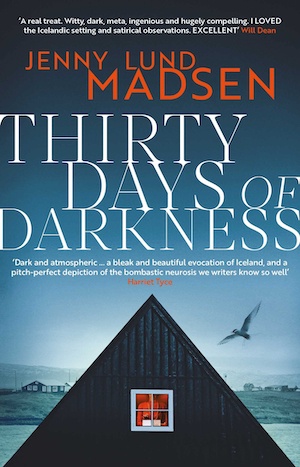
Translated by Megan E Turney — From Ruth Galloway to Eve Ronin, if there’s one thing readers can’t complain about in recent years it’s a lack of strong female protagonists in crime novels. Now, debut Danish author Jenny Lund Madsen introduces Hannah Krause-Bendix, who is perhaps more she-devil than shero.
Hannah is a Copenhagen-based literary author who looks down her nose at genre fiction writers, especially those who write formulaic crime fiction. However, the glowing reviews received by her high-brow books never convert into sales.
Against her will and mostly to please Bastian, her agent, Hannah attends a festival for a book signing. After nearly bringing one of Bastian’s editorial assistants to tears, Hannah notices that her nemesis, Jørn Jensen – ‘the world’s worst crime writer’ – is about to be interviewed. To the amusement of the crowd, the two renowned authors start an argument about the legitimacy of crime fiction, instigated when Hannah throws a book at him!
Jørn revels in tormenting Hannah and it makes for entertaining reading. In the heat of the moment Hannah proclaims that any idiot can write a book and paints herself into a corner. Within a month, she has to complete a crime novel, and she will learn that it’s not quite as easy as she thinks.
Bastian recognises a good marketing opportunity when he sees one and immediately ships Hannah off to Húsafjöður, a remote Icelandic village, to stay with Ella, a friend of his family’s. Hannah needs inspiration and a dramatic change of scenery might do the trick.
When Hannah arrives at the airport, Ella is nowhere to be seen. Like a true crime author, Hannah’s first assumption is that the elderly woman must be dead in a ditch somewhere after having a heart attack. Fortunately, Ella is very much alive, albeit somewhat late. She doesn’t speak Danish or English but understands enough to reprimand Hannah for her foul language.
Eventually, the Icelandic landscape does have a calming effect on Hannah and she settles down to write, taking inspiration from a book of the sagas Ella has given her – plus, of course, the stash of red wine in her suitcase. Two days after her arrival, more tangible inspiration arrives in the form of a corpse. The body of Thor, the only child of a local fisherman, is discovered floating in the harbour by his father. The incident unsettles the inhabitants of Húsafjöður, a town where little ever happens, where doors are left unlocked and people trust each other.
Thor was terrified of water and couldn’t swim, which places doubt on the possibility of an accident. Hours before his death he had an argument with his best friend Jonni, leaving for home shortly after. Jonni was the last person to see Thor alive, but now he’s missing too…
Viktor, the town’s only policeman, won’t divulge anything about Thor’s death, but Hannah takes extreme interest because the events might make excellent material for her novel. At first he humours her but soon Viktor loses his patience, especially when Hannah becomes close to his wife, Margrét.
As is often the case in small towns in crime novels, there are hidden secrets and people desperate to keep it that way. Questions are raised about Gisli, the homeless man whose shack is close to where Thor was found. But it could also be that someone exacted revenge on Thor’s father, a callous businessman who purchased all the local fishing quotas for himself. Even when a possible suspect is apprehended, Viktor lacks conclusive evidence.
Hannah is the protagonist you’ll love to hate. She’s short-tempered, impulsive, obnoxious, occasionally manipulative and actually quite unbearable. This is a woman who is irritated by other people and everything they do – other plane passengers, Ella’s driving, people with no eyebrows (they lack character), greetings cards and even snow (held hostage by the Christmas industry). She proudly declares that sarcasm and humiliation are her only weapons.
Fortunately, her prickliness is smoothed as the story progresses. By the end, you might almost like her. At least she’s funny even when she’s mean and her astute observations and constant meddling make for a promising detective. We can vividly imagine a setting when she describes it and her unique and colourful way of looking at a simple scene or landscape contributes to the charm of the novel. Also noteworthy is the occasional incorporation of Danish and Icelandic phrases, which adds a layer of authenticity while not interfering with comprehension of the text.
Much like the herring has helped Iceland to prosper, Madsen’s novel is pickled with a slew of red herrings to mislead readers. Yes, there are some aspects that appear clichéed at first. The town is cut off from the rest of Iceland by a cold front, small-town secrets must be kept at all cost, and the dark Arctic nights close in. However, author Jenny Lund Madsen, whose screenwriting credits include Follow the Money and Rita, manages to put a fresh spin on Nordic noir through satire.
Thirty Days of Darkness is very tongue-in-cheek, poking fun at the eternal conflict between literary and genre fiction. It’s both deliciously dark and a hell of a lot of fun to read. The question remains: will Hannah finish her crime novel? You’ll have to read it to find out.
For something Scandi and just as quirky, try Kahlman by Joachim B Schmidt.
Orenda Books
Print/Kindle
£5.99
CFL Rating: 4 Stars










